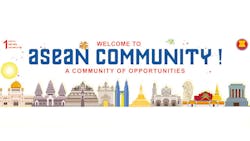JAKARTA -- Aimed at boosting the region's trading clout and attracting more investment, Southeast Asian nations officially launched an EU-inspired economic bloc on Dec. 31. However analysts said a true single market was still a long way off.
The ten-member Association of Southeast Asian Nations (ASEAN) hailed the project as a "milestone" in combining the economic force of a resource-rich and growing market of more than 600 million people.
ASEAN includes wealthy Singapore, one of the world's most developed countries, oil-rich Brunei, developing states such as Malaysia, Indonesia, Thailand, the Philippines and Vietnam, and poorer nations like Cambodia, Laos and Myanmar.
ASEAN leaders signed a declaration to establish the AEC at the group's annual summit in November but there was no official ceremony on Thursday to mark the new bloc's establishment.
The vision for the ASEAN Economic Community (AEC) is a single market with a free flow of goods, capital and skilled labor, which should help the region compete with the likes of China for foreign investment.
Although ASEAN's plans were inspired by the developed single market of the 28-member European Union, officials insist they want to pursue integration in a way suitable to the region's circumstances, and have ruled out a common currency.
The new bloc "will contribute significantly to the region’s growth and create developmental opportunities for all," said Vivian Balakrishnan, the foreign minister of ASEAN member Singapore.
But experts say such an idea is difficult, if not impossible, to achieve in a region marked by extremes in development levels, democratization, and institutional capability. The official launch of the AEC has no practical effect, and diplomats have said ASEAN -- regularly criticized for a lack of concrete achievements -- was keen not to miss its own deadline of 2015, set several years ago.
Research group Capital Economics said in a note the establishment of the AEC was "no game changer", and it was likely to fall short in tackling major challenges such as reducing non-tariff barriers and improving infrastructure.
"ASEAN, with its tradition of non-interference into the affairs of member countries, an absence of penalties for non-compliance, and a lack of a powerful central bureaucracy, is ill-equipped to tackle these obstacles," it said.
John Pang, a senior fellow at Singapore's S. Rajaratnam School of International Studies, said there would be only "slow and incremental progress" in integrating the economies of Southeast Asia. "The AEC will not be raising the curtain on any radical change," he wrote in a commentary.
Diplomats have conceded the single market vision is many years away, but insist the project will help change mindsets and provide momentum. Southeast Asia has already made progress on lower-hanging fruit like cutting tariffs and removing other hurdles such as clashing customs systems but significant non-tariff and other barriers remain.
Copyright Agence France-Presse, 2015
About the Author
Agence France-Presse
Copyright Agence France-Presse, 2002-2025. AFP text, photos, graphics and logos shall not be reproduced, published, broadcast, rewritten for broadcast or publication or redistributed directly or indirectly in any medium. AFP shall not be held liable for any delays, inaccuracies, errors or omissions in any AFP content, or for any actions taken in consequence.
